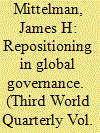|
|
|
Sort Order |
|
|
|
Items / Page
|
|
|
|
|
|
|
| Srl | Item |
| 1 |
ID:
116895


|
|
|
|
|
| Publication |
2013.
|
| Summary/Abstract |
Contemporary globalisation is characterised by an explosion of organisational pluralism. Acronyms such as brics (Brazil, Russia, India, China and South Africa), ibsa (India, Brazil and South Africa), and basic (Brazil, South Africa, India and China) abound. This proliferation of groupings signals a repositioning within global governance and their names serve as metaphors for adjustments among formal and informal modes of global governance. They may be understood in terms of global bricolage: a framework for analysing incipient assemblages in global governance. Rooted in cultural political economy, this notion offers a language for grasping a loose meshwork of groupings based on certain large countries in the global South. The concept of global bricolage deepens analysis of polycentric governance and enables observers to identify three major tensions that mark contemporary global order. The antinomies are between old and new narratives that represent actual or potential shifts in prevailing forms of global governance, between an emancipatory spirit and contested neoliberal norms, and between interregional coalitions and intraregional differences. Quite clearly, the manner of addressing them will bear greatly on the shape of future world order.
|
|
|
|
|
|
|
|
|
|
|
|
|
|
|
|
| 2 |
ID:
052637


|
|
|
| 3 |
ID:
144257


|
|
|
|
|
| Summary/Abstract |
This exploratory case study of repositioning focuses on changing relations among actors and the structures of global governance. It examines interactions between formal institutions, particularly the IMF, and informal networks of authority manifested in global forums, such as the G7/G8 and G20. The core argument is that global repositioning may be best understood in terms of increasing pliability in neoliberal globalisation. Pliable neoliberalism encompasses elasticity in practices and the stretching of spatial and institutional networks, plus pushback in the global North and South. It has two axes, one lateral and the other longitudinal. The former constitutes changes in global governance institutions; the latter turns on the resilience of neoliberalism and challenges to it. Horizontal shifts in global governance, as in changes in membership organisations, are made possible by verticality – hierarchies in social power relations. The evidence is drawn from documentary research and semi-structured discussions with global governance officials in Africa, Europe and North America.
|
|
|
|
|
|
|
|
|
|
|
|
|
|
|
|
| 4 |
ID:
087284


|
|
|
|
|
| Publication |
2009.
|
| Summary/Abstract |
While the salience of race is rising in public discourse, the dominant knowledge structure in international studies has deflected this issue. A look at curriculum and research programs suggests that the transnational dimensions of race are sidelined. The core concept of state sovereignty rarely opens to questions of race. Yet there is a longstanding tradition in transnational race relations, including substantial literature and university initiatives. These have had a tangible impact on the activities of international organizations. To restart such efforts in ways appropriate for our times, it is suggested that six sets of interaction between globalization and race could form the core of a curriculum and research program. This foundation provides the basis for explaining how the politics of "we" and "they," friends and enemies, operates in racializing questions of identity, especially after 9/11, when inclusion and exclusion are increasingly securitized.
|
|
|
|
|
|
|
|
|
|
|
|
|
|
|
|
| 5 |
ID:
052962


|
|
|
|
|
| Publication |
Aug 2004.
|
| Summary/Abstract |
From a critical perspective, preciselywhat kind of knowledge about globalization is meaningful? The distinctive province of a critical orientation to globalization is coming to be defined by a complex of five interacting components: reflexivity, historicism, decentring, cross-overs between social inquiry and other streams of knowledge, and an emphasis on strategic transformations.Critical globalization studies may be employed to identify diverse tendencies in world order, parts of a contradictory whole that coexist, with different logics colliding with one another. These are element of old configuration, multilateral, globalization; the contemporary structure, militarized globalization; and the potential constellation, democratic globalization. The motor of transformation is not only countervailing power but also alternative knowledge, which should be demystifying and enabling.
|
|
|
|
|
|
|
|
|
|
|
|
|
|
|
|
|
|
|
|
|